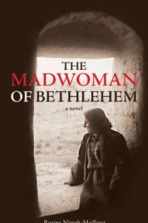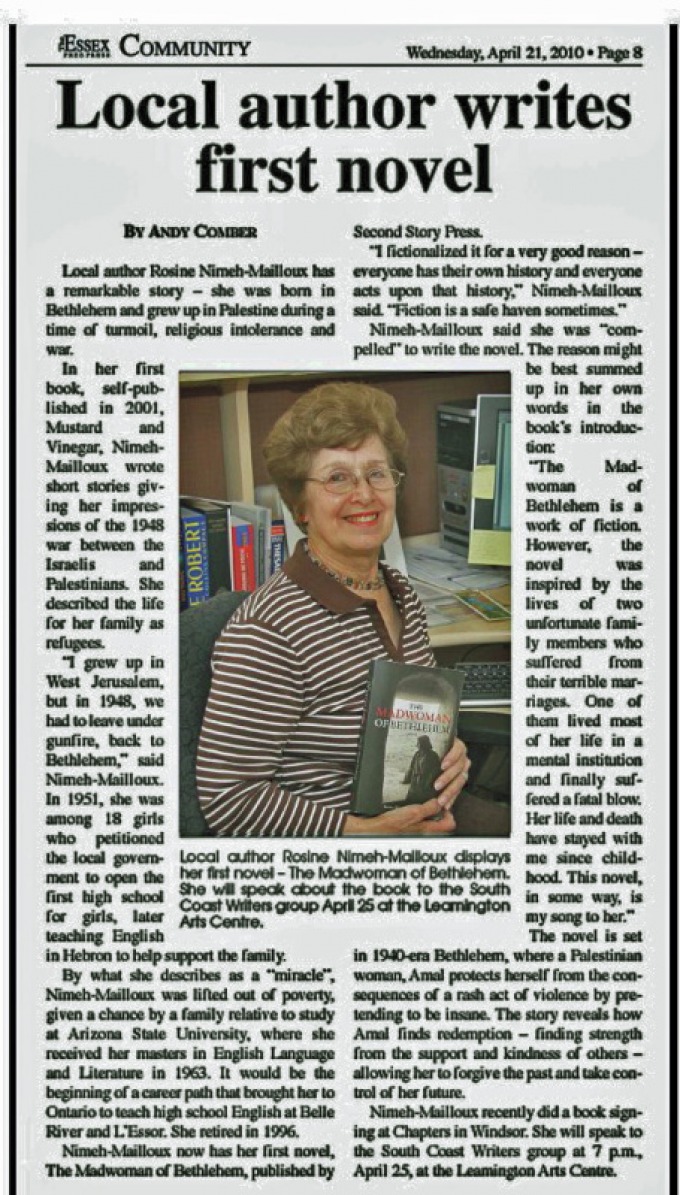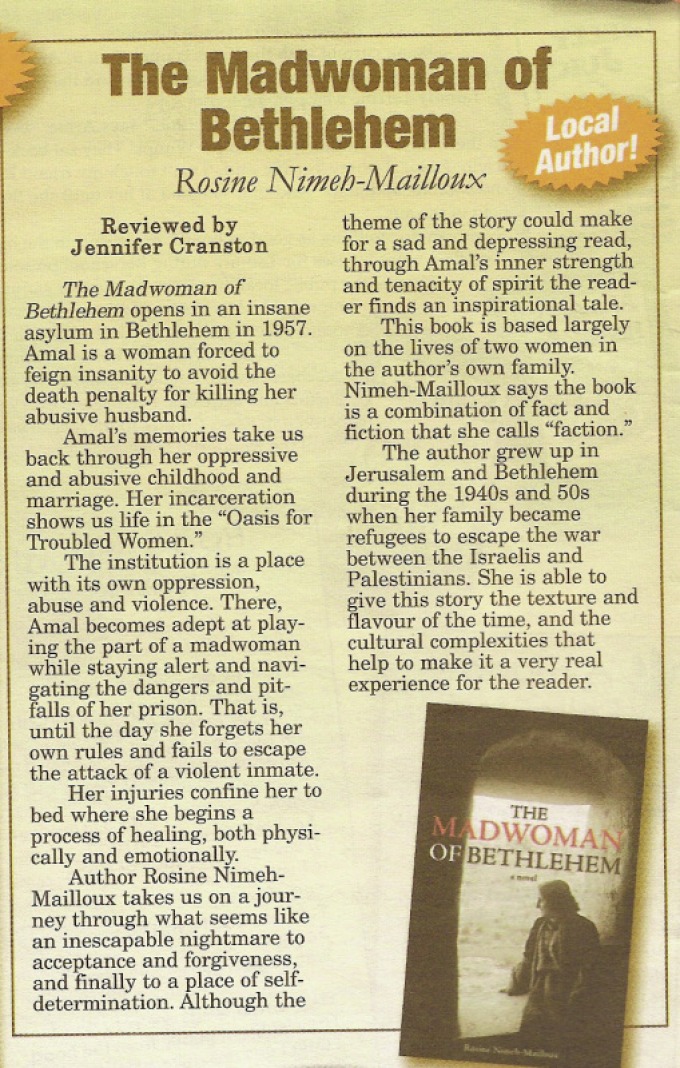Novel by Rosine Nimeh-Mailloux

Second Story Press, October 2008
ISBN-10: 1897187483
ISBN-13: 978-1897187487
Paperback: 352pp; $18.95
Review by Christina Hall
Don’t let the title or shadowy sepia cover fool you; this is not your typical Middle Eastern novel: sad, dark, slow, un-relatable. There are no silent, dark-clad, wise old women or handsome, ruthless, old-fashioned, but still socially respectable young men. The plot isn’t made slow by verbally artistic renditions of the dusty scenery or groups of loyal women milling around the well. The tone is not sad in a “you’ll-never-know-what-it’s-like, feel-sorry-for-the-lot-of-us, but-our-life-is-beautiful,” distant kind of way.
It is often sad, and at times dark, but Bethlehem, Palestine native, Rosine Nimeh-Mailloux has written an honest novel. Her novel does not attempt to defend, explain or stereotype the culture and societal expectations of mid-twentieth century Bethlehem. In fact, she does just the opposite through the main character, Amal, the madwoman from the title.
Amal’s story is told through both first person and third person point of view. This was a genius and necessary decision on the part of Mrs. Nimeh-Mailloux.
Amal first speaks directly to us from the asylum. The book opens with an almost funny description of her life in the madhouse and descriptions of a few of the other inmates. Most importantly, Amal subtly relays to the reader that she is not mad; she only pretends. She explains to the reader how she stays safe and sane while playing the part of an inmate; Amal’s “golden rule” is “a little weeping, a little whimpering. Now giggling, then moaning. Laugh a little. Cry a little. Sing your heart out. Dance. Especially when the orderlies or nurses are around. But never let go completely.” The potential problem with a first person narrator (particularly one in a madhouse who claims sanity) is the ever popular unreliable narrator.
This is where the genius of the author comes in. When Amal isn’t speaking to us from the madhouse, Amal’s story is told from a completely omniscient point of view. The events that shaped Amal’s life and sent her to the madhouse are told from a source that is reliable. The narrator tells us exactly what happened, while relaying both Amal’s and other character’s thoughts and feelings as well. Combined with Amal’s own words from the asylum, the reader is left with no doubt as to the truth. We can let ourselves be completely absorbed by the novel.
And we are. The novel is full of emotion, sex, lies, gossip and manipulation, none of which is simply a selling point. Every sentence in the novel feels essential and full of depth. The story moves. The back and forth between present and past doesn’t feel forced, and we care equally about what is happening in the madhouse and what has already happened to Amal outside of the madhouse. Part of this is the mysterious reason that Amal decided it would be beneficial to feign insanity and be committed, and the unspoken “sin” she says could never be forgiven. Primarily, however, the reason I was driven to keep reading was the relationship I had developed with Amal.
A good novel makes a reader feel like they know a character. A great novel makes the reader care about the character in a way that affects the reader. A way that makes you think about yourself and makes you miss that relationship when the book is over. Despite the fact that Amal’s story takes place fifty years ago or that she grew up in a culture completely different than mine, I felt a connection with her. She was not a Middle Eastern woman; she was a woman. And I became not only a woman, but a Middle Eastern woman, in a way. I felt her anger and entrapment; I understood her bitterness.
Amal is an intriguing character. She is contradictory and inconsistent, all in a very consistent and realistic way. She is human. While Amal is the strong point in the novel, the driving force, within her also lies the fault of the novel. When the novel opens, she is very bitter and angry. When the novel closes, she is still very bitter and angry. In the very last chapter, Amal says, “The more I think about it, the more I am not certain I will ever be able to forgive my father.” She refers to her mother as a coward and shows no signs of even attempting understanding. There is no measurable growth. It makes the reader wonder, then, what is the point of telling the story? What has Amal learned from her nine years in the asylum? You think she will finally take responsibility for her own emotions, but she never does. And her newly discovered self reliance is questionable. While she ends the book with the strong statement, “I will rescue myself,” directly prior to that she claims the asylum as her home, saying she is surrounded by “protectors.”
While Amal’s lack of development is a disappointment, the rest of the novel was not. And perhaps the ending was intended by the author. She was, after all, very aware of her character and setting throughout The Madwoman of Bethlehem. Maybe it was just me, always looking for hope, blindly optimistic, like the young Amal.
ISBN-10: 1897187483
ISBN-13: 978-1897187487
Paperback: 352pp; $18.95
Review by Christina Hall
Don’t let the title or shadowy sepia cover fool you; this is not your typical Middle Eastern novel: sad, dark, slow, un-relatable. There are no silent, dark-clad, wise old women or handsome, ruthless, old-fashioned, but still socially respectable young men. The plot isn’t made slow by verbally artistic renditions of the dusty scenery or groups of loyal women milling around the well. The tone is not sad in a “you’ll-never-know-what-it’s-like, feel-sorry-for-the-lot-of-us, but-our-life-is-beautiful,” distant kind of way.
It is often sad, and at times dark, but Bethlehem, Palestine native, Rosine Nimeh-Mailloux has written an honest novel. Her novel does not attempt to defend, explain or stereotype the culture and societal expectations of mid-twentieth century Bethlehem. In fact, she does just the opposite through the main character, Amal, the madwoman from the title.
Amal’s story is told through both first person and third person point of view. This was a genius and necessary decision on the part of Mrs. Nimeh-Mailloux.
Amal first speaks directly to us from the asylum. The book opens with an almost funny description of her life in the madhouse and descriptions of a few of the other inmates. Most importantly, Amal subtly relays to the reader that she is not mad; she only pretends. She explains to the reader how she stays safe and sane while playing the part of an inmate; Amal’s “golden rule” is “a little weeping, a little whimpering. Now giggling, then moaning. Laugh a little. Cry a little. Sing your heart out. Dance. Especially when the orderlies or nurses are around. But never let go completely.” The potential problem with a first person narrator (particularly one in a madhouse who claims sanity) is the ever popular unreliable narrator.
This is where the genius of the author comes in. When Amal isn’t speaking to us from the madhouse, Amal’s story is told from a completely omniscient point of view. The events that shaped Amal’s life and sent her to the madhouse are told from a source that is reliable. The narrator tells us exactly what happened, while relaying both Amal’s and other character’s thoughts and feelings as well. Combined with Amal’s own words from the asylum, the reader is left with no doubt as to the truth. We can let ourselves be completely absorbed by the novel.
And we are. The novel is full of emotion, sex, lies, gossip and manipulation, none of which is simply a selling point. Every sentence in the novel feels essential and full of depth. The story moves. The back and forth between present and past doesn’t feel forced, and we care equally about what is happening in the madhouse and what has already happened to Amal outside of the madhouse. Part of this is the mysterious reason that Amal decided it would be beneficial to feign insanity and be committed, and the unspoken “sin” she says could never be forgiven. Primarily, however, the reason I was driven to keep reading was the relationship I had developed with Amal.
A good novel makes a reader feel like they know a character. A great novel makes the reader care about the character in a way that affects the reader. A way that makes you think about yourself and makes you miss that relationship when the book is over. Despite the fact that Amal’s story takes place fifty years ago or that she grew up in a culture completely different than mine, I felt a connection with her. She was not a Middle Eastern woman; she was a woman. And I became not only a woman, but a Middle Eastern woman, in a way. I felt her anger and entrapment; I understood her bitterness.
Amal is an intriguing character. She is contradictory and inconsistent, all in a very consistent and realistic way. She is human. While Amal is the strong point in the novel, the driving force, within her also lies the fault of the novel. When the novel opens, she is very bitter and angry. When the novel closes, she is still very bitter and angry. In the very last chapter, Amal says, “The more I think about it, the more I am not certain I will ever be able to forgive my father.” She refers to her mother as a coward and shows no signs of even attempting understanding. There is no measurable growth. It makes the reader wonder, then, what is the point of telling the story? What has Amal learned from her nine years in the asylum? You think she will finally take responsibility for her own emotions, but she never does. And her newly discovered self reliance is questionable. While she ends the book with the strong statement, “I will rescue myself,” directly prior to that she claims the asylum as her home, saying she is surrounded by “protectors.”
While Amal’s lack of development is a disappointment, the rest of the novel was not. And perhaps the ending was intended by the author. She was, after all, very aware of her character and setting throughout The Madwoman of Bethlehem. Maybe it was just me, always looking for hope, blindly optimistic, like the young Amal.
Feminist Review
The Madwoman of Bethlehem By Rosine Nimeh-Mailloux
Second Story Press
Before I started to read The Madwoman of Bethlehem, a story about a woman’s struggle against her patriarchal culture, I wondered whether it would be depressing. It wasn’t. From the beginning, when Rosine Nimeh-Mailloux sets up the present, where Amal is incarcerated in an asylum for women, the writing captivated me.
Yes, the main character, Amal, is born into tough Palestinian life as a female, subjected to her mean grandmother and later, drunken husband, but I never once feel sorry for her. She gives off the energy of a feisty spirit and does not give up. It doesn’t matter how terrible the situation is; we all have the choice to fight or give up.
As Amal’s history is slowly revealed, the author also provides background of the other characters, so that the reader gains understanding of the complex context they exist in. It isn’t just Amal who is expected to obey her husband, but all women, according to Allah. By treating Amal as a servant, she will learn proper behavior—or so her family believes.
Amal refuses to accept the ancient view that women belong to men to do with as they please, she argues that her family betrays her by trading her off to get her sister a nice deal. Her view falls on deaf ears, but she does find an ally to turn to during her journey to acceptance.
So many girls and women in many cultures from around the world have been betrayed by their families under the guise of the old “it’s for your own good” philosophy. This novel is inspiring despite this typical letdown. I have spent years resenting my own family’s strict patriarchal ways, but after reading Nimeh-Mailloux’s novel, I know that I have to accept that it is simply their belief system, not mine.
Amal the character may be fictional, but she is based on the lives of women in the author’s family. She is also the voice of oppressed women in today’s world. She is me and you when we learn to stand up to abuse against women and children.
Whether you’re looking for a bit of inspiration or simply a good page-turner, you’ll find it in The Madwoman of Bethlehem. I didn’t want to put the book down. It is an emotional trip, from tears to laughter and back again.
Review by Nicolette Westfall
Second Story Press
Before I started to read The Madwoman of Bethlehem, a story about a woman’s struggle against her patriarchal culture, I wondered whether it would be depressing. It wasn’t. From the beginning, when Rosine Nimeh-Mailloux sets up the present, where Amal is incarcerated in an asylum for women, the writing captivated me.
Yes, the main character, Amal, is born into tough Palestinian life as a female, subjected to her mean grandmother and later, drunken husband, but I never once feel sorry for her. She gives off the energy of a feisty spirit and does not give up. It doesn’t matter how terrible the situation is; we all have the choice to fight or give up.
As Amal’s history is slowly revealed, the author also provides background of the other characters, so that the reader gains understanding of the complex context they exist in. It isn’t just Amal who is expected to obey her husband, but all women, according to Allah. By treating Amal as a servant, she will learn proper behavior—or so her family believes.
Amal refuses to accept the ancient view that women belong to men to do with as they please, she argues that her family betrays her by trading her off to get her sister a nice deal. Her view falls on deaf ears, but she does find an ally to turn to during her journey to acceptance.
So many girls and women in many cultures from around the world have been betrayed by their families under the guise of the old “it’s for your own good” philosophy. This novel is inspiring despite this typical letdown. I have spent years resenting my own family’s strict patriarchal ways, but after reading Nimeh-Mailloux’s novel, I know that I have to accept that it is simply their belief system, not mine.
Amal the character may be fictional, but she is based on the lives of women in the author’s family. She is also the voice of oppressed women in today’s world. She is me and you when we learn to stand up to abuse against women and children.
Whether you’re looking for a bit of inspiration or simply a good page-turner, you’ll find it in The Madwoman of Bethlehem. I didn’t want to put the book down. It is an emotional trip, from tears to laughter and back again.
Review by Nicolette Westfall
THE MADWOMAN OF BETHLEHEM BY ROSINE NIMEH-MAILLOUX
Publisher: Second Story Press
Toronto
www.secondstorypress.ca
Wow, I just completed Rosine Nimeh-Mailloux’s novel, The Madwoman of Bethlehem and wish to congratulate Rosine on her very compelling first novel, as well as congratulate your publishing company on its publication of this very fine work of art. This is a novel you don’t want to put down; you want to know the fate of Amal, no matter what it may turn out to be. The truth within the fiction rings through and breaks the heart of the reader. I have contacted the local Chapters and Indigo bookstores requesting that visible copies be advertised and available. They have responded that recently they have given much earned limelight to this local work. I personally shall recommend it to members of local book clubs, as well as to my daughter who is currently taking a course at Columbia University on the empowerment of women. I think that Rosine has crafted a tale of the universal plight of women that needs to be told.
……………. I certainly hope to soon read of (if not yet achieved) much deserved awards for this excellent work of fiction that speaks from the heart and delivers to the heart.
Kudos to Rosine!
Rochelle Mullins
Publisher: Second Story Press
Toronto
www.secondstorypress.ca
Wow, I just completed Rosine Nimeh-Mailloux’s novel, The Madwoman of Bethlehem and wish to congratulate Rosine on her very compelling first novel, as well as congratulate your publishing company on its publication of this very fine work of art. This is a novel you don’t want to put down; you want to know the fate of Amal, no matter what it may turn out to be. The truth within the fiction rings through and breaks the heart of the reader. I have contacted the local Chapters and Indigo bookstores requesting that visible copies be advertised and available. They have responded that recently they have given much earned limelight to this local work. I personally shall recommend it to members of local book clubs, as well as to my daughter who is currently taking a course at Columbia University on the empowerment of women. I think that Rosine has crafted a tale of the universal plight of women that needs to be told.
……………. I certainly hope to soon read of (if not yet achieved) much deserved awards for this excellent work of fiction that speaks from the heart and delivers to the heart.
Kudos to Rosine!
Rochelle Mullins


